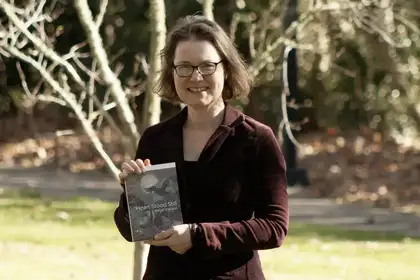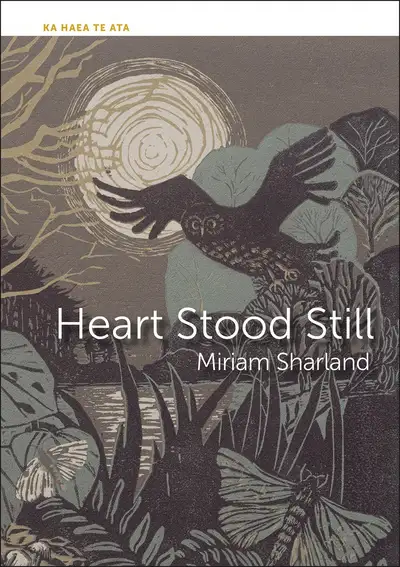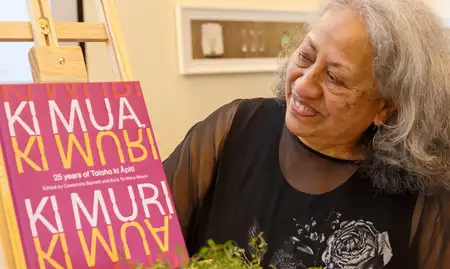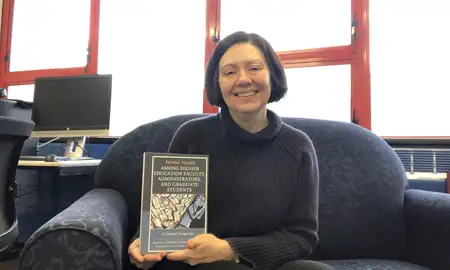
Miriam Sharland with her new book Heart Stood Still
In 2020, Miriam was planning to return home to England to spend time with her family and to write a book about the Royal Air Force (RAF) in World War Two, but nationwide lockdowns meant she was unable to leave Manawatū.
Rather than flying to the other side of the world, Miriam used the time to explore her local region, discovering some of its stories and coming to appreciate its natural beauty. The book follows her as she creates a food garden and moves around Manawatū mostly on foot or by bike, immersing herself in the landscape, observing the native and introduced plants and animals that surround her, and finding solace in the natural world.
Through a series of interconnected essays following the seasons, each based on a natural element such as blossom, wind or stars, she weaves in reflections on her life in England and her family history as she explores what it means to belong.
The narrative moves between personal memoir and pressing ecological issues. For example, digging soil in her Palmerston North garden and coming to understand that she inherited her “love of dirt” from her long-deceased father in England, to a United Nations report that suggests the world’s topsoil could disappear in 60 years. The book is a celebration of the natural world as well as a lament for its loss.
Towards the end of the book there is a shift in the world’s meaning, in Miriam’s life and in her understanding of the past as she realises that, like the migratory godwits she has observed at Foxton estuary, she can belong to two places.
Heart Stood Still is the first book Miriam has published. It formed the creative portion of her Master of Creative Writing at Te Kunenga ki Pūrehuroa Massey University, which she completed in 2022. Miriam has worked at Massey since 2012 as a Web Content Editor.

Heart Stood Still
Miriam says, “I’m very grateful to my supervisor Ingrid Horrocks for taking my first raw attempts at writing memoir and helping me to mould them into a publishable manuscript. I’m also grateful to my family for allowing me to use our shared history, in particular my mum, whose stories feature frequently in the book.”
She has now returned to the book about the RAF that she was writing at the beginning of lockdown. Miriam’s uncle served as a rear gunner in Bomber Command and was killed in action in 1944. When she was able to return to England in 2022, she cycled on her Brompton folding bike to the sites of all the bases where her uncle was stationed during the war, which took her from Cornwall in southwest England to Edinburgh, a journey of 1600km.
“I’m glad now that I had to put my RAF book on hold even though it seemed like a setback at the time. Writing Heart Stood Still and seeing it released into the world has been such a joy. It’s met with an overwhelmingly positive response and I love it when people tell me that they’ve enjoyed reading about Manawatū, or about England, and how it’s helped them reflect on their place in the world too.”
Heart Stood Still is available for purchase from Otago University Press. It’s part of the Ka Haea Te Ata series, a series dedicated to casting light on issues of importance in Aotearoa New Zealand today.
Related news
'Ki Mua, Ki Muri' a new book charting the path of Toioho ki Āpiti
'Ki Mua, Ki Muri' examines the last 25 years of the influential programme that sought to revitalise what it means to be Māori in modern-day Aotearoa. As penned by the forewords of artist Nigel Borell, “Toioho ki Āpiti has led the quiet revolution in Māori art.”

New book addresses mental health in higher education
A new book by Dr Teresa Heinz Housel from the School of Communication, Journalism and Marketing examines mental health in higher education.

New book highlights New Zealand’s great forgotten First World War victory
Gallipoli was a disaster, the Somme was a blood bath, and Passchendaele was a massacre. Yet a resounding victory in 1917 that New Zealand was involved in has long been forgotten.
